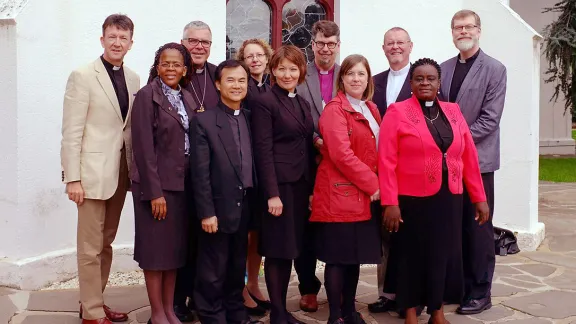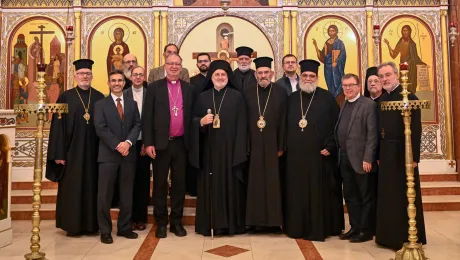
Members of the Anglican-Lutheran International Coordinating Committee at work during their last meeting, May 2016, in Adelaide, Australia. Co-chairperson Bishop Michael Pryse is third from the left. Photo: Paul March
Interview with Canadian Bishop Michael Pryse
(LWI) – An international committee coordinating the progress of Lutheran-Anglican relationship around the world is about to conclude its four-year mandate, with the publication of joint devotional materials later this year.
Following the recent meeting of the Anglican-Lutheran International Coordinating Committee (ALICC), Canadian Lutheran co-chairperson Bishop Dr Michael Pryse talked to Lutheran World Information about the committee’s work and the future of relations between the two global communions.
What are some of the significant outcomes of ALICC?
Our mandate was somewhat different from typical ecumenical dialogues in that it specifically directed us to try and serve as a catalyst in encouraging deeper relationships between Lutherans and Anglicans globally. During the course of our work, from 2013 to 2016, we have been able to map out and describe existing relationships in particular regional contexts. By the end of this year, we will have developed a tool identifying potentially fruitful next steps that Lutherans and Anglicans can use to deepen partnerships in their unique contexts.
We are also about to complete a six-week series of devotional reflections developed jointly with our partners from around the globe. The series explores the importance of furthering Lutheran - Anglican relationships in support of the missio dei [God’s mission], implications for diaconal work, and LWF’s 500th anniversary theme Liberated by God's Grace and its sub-themes stating that salvation, human beings and creation are not for sale. The material will be available by the end of this year and is a joint Anglican-Lutheran contribution to the commemoration of the 500th anniversary of the Reformation.
Were there difficult questions that you were not able to take up in the committee?
The primary and ongoing challenge in this work is that of learning to understand, appreciate and take seriously, the importance of local context. Partnerships and the path toward deepened relationship look very different depending on the unique nature of the context in which our regional churches live and minister. There is no “one-size fits-all” model for this work. This truth presents an ongoing challenge, but also, a source of great richness and requires a patient persistence from those who seek to advance Lutheran and Anglican relationships globally.
We are also about to complete a six-week series of devotional reflections … [which] explores the importance of furthering Lutheran - Anglican relationships in support of the missio dei [God’s mission], implications for diaconal work, and LWF’s 500th anniversary theme Liberated by God's Grace.
Looking forward, how do you see Anglican-Lutheran relations evolving globally?
I see these relations continuing to advance at a steady, albeit uniquely fashioned, pace. Advances at the communion level will be a source of genuine encouragement, but will be reflected differently within the various regional and national contexts. Signs of such growth have been plainly evident in the reports that ALICC received over the course of this mandate. I would strongly encourage our respective communions to think about a new model to emphasize the catalyst function.
How have relationships among the committee members been reflected in the dialogue process?
The relationships among and between committee members have been a rich source of deepened understanding and personal renewal for me and, I trust, all members of the committee. Many of our members are functioning in a second, or even third, language and come from extremely diverse ecclesial and social contexts. We learned that it is important to listen carefully to one another and be and to take as much time as is necessary for all members to reflect upon and respond to the topics under discussion.
Background
International dialogue between the LWF and Anglican Communion has been conducted under different coordinating bodies since the 1970s and produced a number of reports, including, To Love and Serve the Lord. Diakonia in the Life of the Church. At regional level, Anglican and Lutheran churches in Australia, Canada, parts of Europe and the United States of America have reached either full communion relationships or other forms of agreements.


